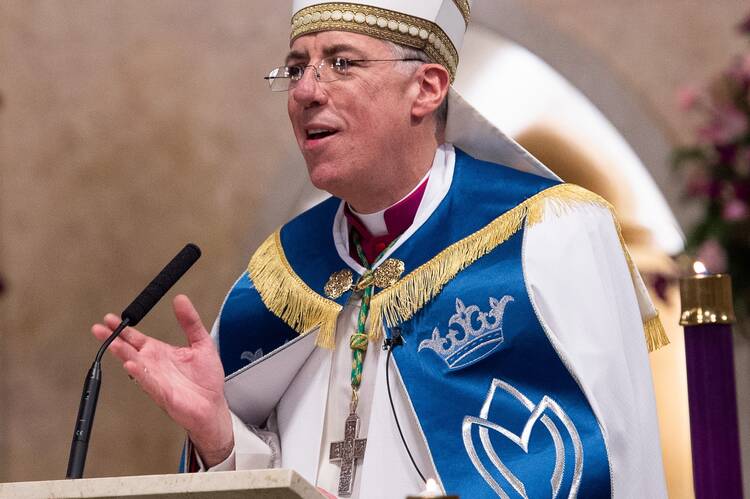METUCHEN, N.J. (CNS) -- New Jersey's new law allowing assisted suicide, effective Aug. 1, "points to an "utter failure" on the part of government and indeed all society, said Bishop James F. Checchio of Metuchen.
It is the failure "to care truly, authentically and humanely for the suffering and vulnerable in our midst especially those living with an incurable disease as well as the frail elderly, the infirm and those living with disabilities," he wrote in a July 29 letter to the 650,000 Catholics in his four-county diocese.
"Assisted suicide is a grievous affront to the dignity of human life and can never be morally justified," he said. The legal permission now granted to this practice does not change the moral law."
Bishop Checchio said that under the new law -- called the Medical Aid in Dying for the Terminally Ill Act -- the elderly "could feel undue pressure to view this as an option to prevent being a burden to others and young people will begin to think that people can and should be disposable."
"Indeed," he added, "with this law there will be a further desensitization of the value of human life."
Democratic Gov. Phil Murphy, a Catholic, signed the assisted suicide bill into law April 12.
It passed the Assembly 41-33 and the Senate 21-16 March 25. As the measure awaited Murphy's signature, pro-life groups and other opponents urged state residents to contact the governor and ask him not to sign the bill into law.
In his statement the day of the signing, Murphy said that "allowing residents with terminal illnesses to make end-of-life choices for themselves is the right thing to do."
"By signing this bill today, we are providing terminally ill patients and their families with the humanity, dignity and respect that they so richly deserve at the most difficult times any of us will face," he said, and thanked the Legislature "for its courage in tackling this challenging issue."
In his letter, Bishop Checchio said he and the other New Jersey bishops as well as the Catholic faithful and others from across the state "fought for over seven years to oppose this law."
At the time Murphy signed the measure, all the Catholic bishops of the state, the New Jersey Catholic Conference and pro-life groups decried his action. Cardinal Joseph W. Tobin of Newark called the new law regrettable, saying "whatever its motives and means," it is "morally unacceptable."
Under the law, competent New Jersey residents over age 18 who have been diagnosed with a terminal illness and have six months or less to live -- and have medical confirmation of their situation -- can get a prescription for a lethal medication to end their life.
Patients will be required to make two separate requests to be approved for the lethal dosage; they also will have the opportunity to rescind their request at any point after receiving approval.
"With the passage of this law by the Legislature and the signing by our governor, we are facing dark times," wrote Bishop Checchio in his July 29 letter. "As a church, we will not stop from advocating for the sanctity of human life, in all stages, and we will continue to educate our legislators, our fellow Catholics and the general public about the dangers of legalized physician-assisted suicide."
St. Peter's University Hospital in New Brunswick, which is sponsored by the Metuchen Diocese, will not cooperate with the new law, said a diocesan news release issued with the text of Bishop Checchio's letter.
The hospital complies with the U.S. bishops "Ethical and Religious Directives for Catholic Health Care Services," which clearly state that "Catholic health care institutions may never condone or participate in euthanasia or assisted suicide in any way."
"As Catholics, we are called to show a different approach to death and the dying; one which accompanies every person as they are dying and allows them to love and to be loved to the very end," wrote Bishop Checchio.
"The purposeful termination of human life via a direct intervention is not a humane action whatsoever. We ought to look instead to minimizing the pain and suffering of the dying and those who are tempted to end their lives," he said.
He called on all Catholics to "strive to help the sick and incapacitated find meaning in their lives, even and especially in the midst of their suffering."
"Let us comfort those facing terminal illness or chronic conditions through our genuine presence, human love and medical assistance," he continued. "Let us, as a society and as individuals, choose to walk with them, in their suffering, not contribute to eliminating the gift of life."
In closing, he wrote: "We look to Our Blessed Mother in our fight to end the threats to human life and a growing culture of death. She is our model and our example of how every human being should be treated as a gift at the beginning and end of life."











“Utter failure of government”? Perhaps utter failure of bishops would better describe the NJ plight.